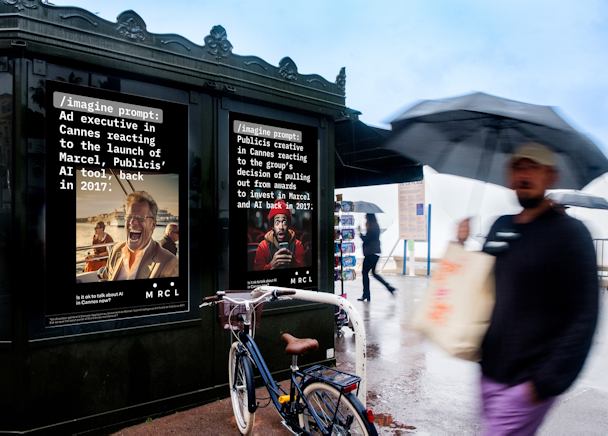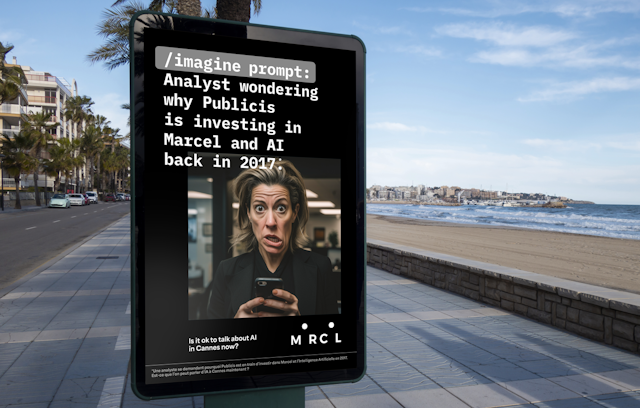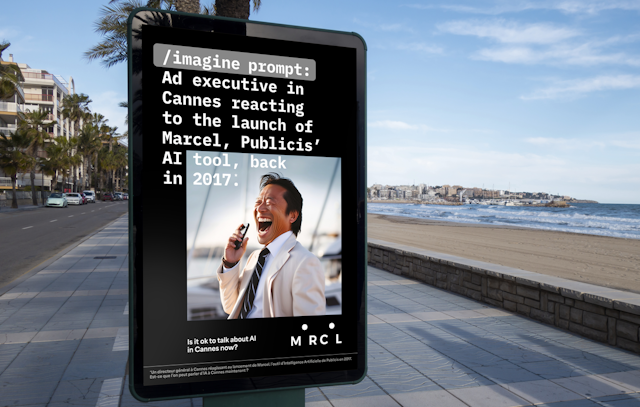Publicis reminds everyone at Cannes Lions that they mocked its AI investment in 2017
The holding company is running a series of tongue-in-cheek ads created by AI to remind the industry of its skepticism.

Publicis
At Cannes Lions 2017, Publicis was mercilessly mocked for an announcement that it would pause all awards and conference budgets and instead make major investments into AI and the creation of a platform called Marcel.
Six years later, the French advertising giant is running a print campaign at the same festival - which has an agenda dominated by keynotes, panels and presentations dedicated to the technology – to remind an industry now obsessed with its applications of that initial skepticism.
Explore frequently asked questions
“In a weird way – even though we’re meant to be an industry of creativity and innovation – big things like that are not necessarily met with the enthusiasm and passion as you would expect,” recalls said Carla Serrano, chief strategy officer, at Publicis Groupe and one of the executives that spearheaded the creation of Marcel.
“We were prescient in understanding AI was a tool that could be beneficial. [But] it was met with ‘oh you’re going to invest in AI so it can take over your talent’. Cut to six years later and it’s absolutely proven itself as a tool. A lot of people are seeing the benefits now and not only are we celebrating Marcel’s sixth birthday this year, but Cannes and the Croisette are finally accepting AI. So, we wanted to celebrate it with a tongue-in-cheek campaign.”
The campaign – created by AI – recreates those initial reactions to this early AI investment, showing the generative AI prompt that brings up shocked, confused and laughing faces. The ads run with the tagline ‘Is it ok to talk about AI in Cannes now?’ They will appear on various sites at the week-long festival.

But it’s not just its rival holding companies the agency wants to prod with the work. Its own staff was among the biggest naysayers.
Advertisement
Back in 2017, chief executive Arthur Sadoun used the Cannes stage to tell its then-cohort of 84,000 staff globally that it would quit all awards and trade shows for a year to develop this AI-backed project management platform. But very little else was revealed about the idea, leading its own staff to complain about the lack of transparency and general internal confusion on what it was all about. Sadoun took to Twitter for a Q&A, which only seemed to spawn more questions from bemused staff.
A year went by with very little said about Marcel. And then, seemingly out of nowhere, a partnership with Microsoft was forced to begin the development of it. A year later, as the pandemic took hold of the world and people were forced to work from home, the first iteration of Marcel rolled out in the UK and then the US and it has continued to develop since then (more on what it can actually do below)
In perhaps the biggest testament to its success, Publicis was recently been asked by a client – it declined to name them – to design and build a version of Marcel for its organization.
Advertisement
And in that time, AI has become the buzzword of the industry, leading the likes of WPP, S4 Capital, Dentsu, Interpublic, Havas and Omnicom to rush out their own AI offerings.
“It feels good to see rivals scrambling,” says Serrano. “We have a six-year gap - we’re six years ahead. We have a talented workforce that now understands [AI] and is running towards it with enthusiasm, but that also gets the privacy and safety [...] we now have a special workforce that understands it.”

Six years on, what does Marcel do?
Today, Marcel is a central part of Publicis Groupe. Out of a global headcount of 98.000 people, 83,000 have signed up and are generally using it on a monthly, though sometimes weekly, basis.
For staff, it creates a personalized profile containing everything they want the company to know about them – from educational background, roles and responsibilities, projects, skills, and interests. Marcel will then suggest people to connect with (via Marcel Café), client briefs that have been issued they might be interested in (through Open Briefs which have been used by Heineken, Walmart and Campbells), current vacancies and potential roles they might be suitable for both within their agency and at the network level (Marcel Gigs) as well as courses they could take to further their development (Marcel Classes).
Its most recent update was the launch of PublicisGPT to advance how its staff uses generative AI. It ensures our people can create data, text and image generations in a safe and private environment while remaining AI-agnostic.
With AI advancing at the rate of noughts, Serrano believes there’s potential for Marcel to evolve into a platform that’s used daily by its global staff to inform their day-to-day work.
“We have a data partner with Epsilon and when you have that, what you can do and provide access to… the knowledge just explodes,” she says. “
We can imagine a world where we empower everyone to be a data analyst without being a coder or researcher. Natural language processing means someone could just ask ‘tell me how many people are interested in drinking vodka and rum in Mauritius’, for example, and if we have that data we can get that. It starts to really share knowledge to create superhuman talent within our organization.”
For the rest of the industry, a wry smile at the print ads plastering the Croisette during Cannes Lions 2023 in acknowledgment of how far it’s come will suffice.

